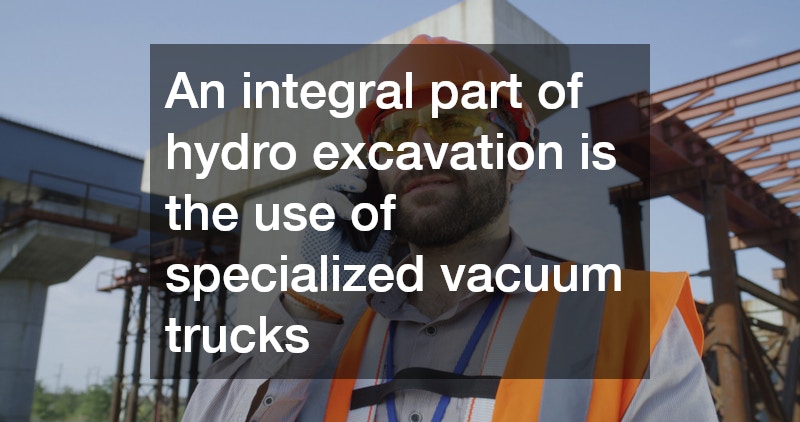What Is Hydro Excavation?

Hydro excavation is an innovative digging technology that leverages high-pressure water jets to loosen soil, which is then removed by a powerful vacuum. This method is beneficial for various applications, ranging from utility installation to maintenance and repair tasks. Its popularity has surged in recent years due to its efficiency, safety, and minimal environmental impact. This article delves into the intricacies of hydro excavation, its benefits, equipment used, and its growing significance across industries.
The Basics of Hydro Excavation
Hydro excavation, or vacuum excavation, is a technique that involves the use of high-pressure water to dislodge soil and earth materials. The slurry created from the soil and water mixture is then vacuumed into a truck-mounted tank.
This method is widely used in areas where traditional mechanical excavation poses a risk to underground utilities or when precision is required. It is particularly valuable in urban settings, where infrastructure density is high and careful excavation is necessary. By avoiding the use of backhoes or manual digging, hydro excavation reduces the risk of damaging existing utility lines and structures.
An integral part of hydro excavation is the use of specialized vacuum trucks. These vehicles are equipped with large storage tanks and powerful vacuums capable of handling both liquid and solid debris. The trucks often feature onboard water tanks that supply the pressurized water used for excavation. The precision offered by these tools makes hydro excavation a preferred method for digging near sensitive structures. Furthermore, the equipment’s ability to handle various soil conditions makes it versatile across different project types.
Hydro air excavation service providers are trained professionals who bring expertise in operating these complex machines. These experts undergo extensive training to ensure both safety and efficiency on site. Many hydro excavation companies offer comprehensive services, covering everything from site analysis to waste disposal. Customer demand for specialized services continues to rise as industries recognize the benefits of non-destructive excavation techniques. These services support various sectors, including construction, oil and gas, and telecommunications, emphasizing their broad applicability.
The Advantages of Using Hydro Excavation
One of the primary advantages of hydro excavation lies in its safety benefits. Traditional mechanical excavation methods often pose significant risks of hitting underground utilities, leading to potential service disruptions and costly repairs. With hydro excavation, operators can dig precisely to expose utilities with minimal disturbance to the surrounding area. This accuracy significantly reduces the likelihood of utility strikes, enhancing overall project safety. Additionally, hydro excavation minimizes the need for manual labor, further decreasing the risk of on-site accidents.
Environmental considerations also favor the use of hydro excavation. The method generates less environmental disruption compared to conventional techniques. Because the process relies on water and air, it minimizes the need for invasive digging methods that can lead to soil erosion and environmental degradation. The equipment is also designed to collect any wastewater and soil for proper disposal, ensuring a clean worksite. Consequently, hydro excavation offers an environmentally friendly alternative that aligns with sustainable construction practices.
Cost efficiency is another notable benefit of hydro excavation. While the initial investment in hydro excavation equipment and services might be higher compared to traditional methods, the reduction in risk and potential damage often leads to significant cost savings. Projects can be completed faster due to the method’s efficiency, reducing labor costs and project timelines. Furthermore, the precision and accuracy minimize the need for additional repairs or corrections. Overall, the reduced risk of damages and quick turnaround time contribute to a more cost-effective digging solution.
Hydro Excavation Equipment and Techniques
The critical components of hydro excavation equipment include high-pressure water systems and vacuum machinery. These elements work in tandem to create a seamless process where the water loosens the earth, and the vacuum system removes the debris. The equipment’s adaptability allows operators to manage a variety of surface types, from soft soils to harder clay and rock formations. Advanced hydro excavation vehicles often come equipped with specialized nozzles that tailor the water pressure to fit varying excavation demands. This flexibility ensures that precision and safety are maintained regardless of the project scope or surface condition.
The use of hydro air excavation service has grown substantially as industries increasingly require solutions that prioritize safety and efficiency. This service has significantly transformed practices in sectors that demand non-destructive digging techniques. Methods used in hydro excavation are continually evolving due to technological advancements. For instance, enhancements in pump technology and vacuum systems increase the efficiency and effectiveness of excavation operations. Companies offering hydro excavation services continue to innovate, staying at the forefront of market demands and technological progress.
Understanding the techniques involved in hydro excavation is vital for maximizing its benefits. Effective communication and coordination among service teams ensure projects are executed smoothly and without incident. Training programs for hydro excavation professionals focus on both operational skills and safety protocols. Consistent use of these advanced techniques promotes a culture of safety and quality in excavation projects. As a result, adopting hydro excavation techniques can significantly improve project outcomes by providing a reliable and modern alternative to traditional digging methods.
Applications of Hydro Excavation Across Industries
Hydro excavation finds application in numerous industries due to its versatility and minimal environmental impact. In the construction industry, it is commonly used for trenching, potholing, and exposing buried utilities safely. Infrastructure projects benefit greatly from hydro excavation’s precision, notably in reducing the time and costs associated with utility relocations and repairs. The method is particularly indispensable in areas where traditional digging would be impractical or hazardous. As urban development continues to expand, the demand for such precision digging services is anticipated to rise steadily.
The telecommunications industry also reaps the benefits of using hydro excavation for installing new cable lines and maintaining existing networks. This method ensures that existing networks remain undisturbed during new installations. Hydro excavation minimizes the risk of service interruption, which is crucial for businesses relying on constant connectivity. Its precision and efficiency make it a preferred choice for expanding telecommunication infrastructure in both urban and rural settings. The growing reliance on digital infrastructure underscores the importance of efficient and safe excavation methods.
The oil and gas industries are another sector where hydro excavation techniques have made a significant impact. The non-destructive nature of the method is ideal for exposing and maintaining pipelines and other underground installations. Hydro excavation is used for daylighting buried assets, ensuring that critical infrastructure is accessed without damage. As a result, it plays a vital role in both maintenance and emergency response scenarios. Given the scale and complexity of oil and gas projects, hydro excavation’s ability to enhance operational safety is invaluable to the industry.
Hydro excavation represents a groundbreaking approach in the realm of excavation, combining safety, precision, and environmental consciousness. As industries increasingly seek efficient, non-destructive methods, the demand for hydro air excavation services continues to grow. This innovative technique addresses many of the limitations associated with traditional excavation, offering a safer, quicker, and more environmentally-friendly alternative. Whether in construction, telecommunications, or oil and gas, hydro excavation provides essential benefits through its precision and efficiency. Embracing this technology paves the way for safer and more sustainable projects, highlighting its significance in modern industry practices.







